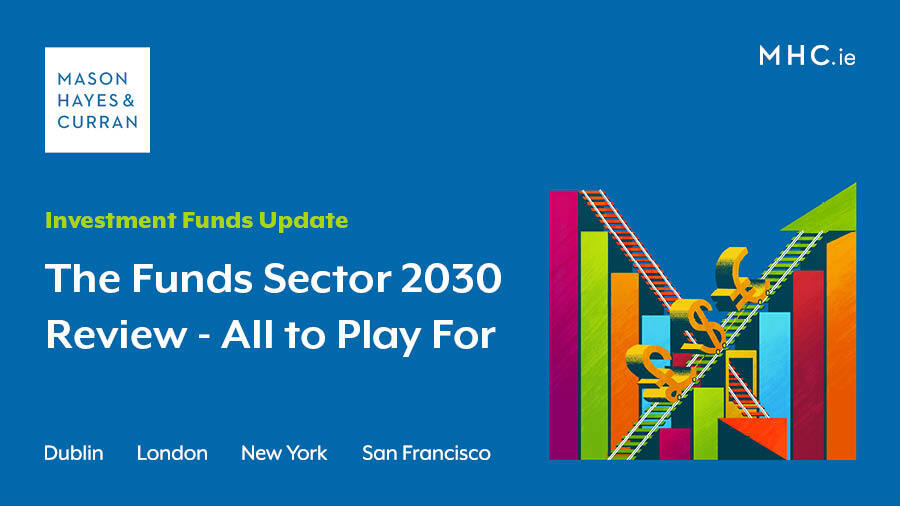
The Funds Sector 2030 review offers an opportunity for the Department of Finance to explore ways to advance and future-proof Ireland’s competitive edge in asset management and fund servicing. Our Investment Funds team reflects on the key priorities for the sector that would benefit from meaningful consideration and industry engagement. We also identify the areas that would potentially suffer as a result of a superficial review.
Ireland’s Minister for Finance recently announced that his department will be conducting a wide-ranging, holistic review of asset management and fund servicing in Ireland (Review). The output of the Review is intended to inform and refresh Ireland’s policy and regulatory framework for the years ahead. The Review will be carried out by a multi-disciplinary team who will “engage extensively with stakeholders” and produce a report containing recommendations as to how the sector can stay “open”, “resilient” and “developing” into the future. A public consultation will take place and a draft report will be presented to the Minister by summer 2024.
The Review represents a landmark opportunity for the Government to delve into the current regulatory climate and identify the opportunities needed to deliver its brief. We explore five key areas.
Fresh legs for the ELTIF
The European Long-Term Investment Funds (ELTIF) is a specialised investment fund that provides investors with access to long-term investments in private equity or real assets. As we noted in our recent article, the ELTIF is undergoing reform at an EU level in response to an initially sluggish uptake. An EU amending regulation was recently published, which aims to make ELTIFs more appealing to investors. However, these changes will not take effect until January 2024, with existing ELTIFs considered compliant for a period of five years thereafter. Only time will tell, therefore, whether having the new and improved ELTIF on the pitch can ultimately score valuable points for “Ireland Inc.” In the meantime, the Review represents an important chance to consider how to best position the ELTIF for success in the Irish context.
Match-ready and fighting fit – winning potential for the ILP
In our recent article, Ireland: Domicile of Choice for Private Funds, we explored how the enhancements to the Investment Limited Partnership (ILP) regime can help Ireland compete with limited partnerships in other leading jurisdictions. Ireland updated and modernised its regulatory framework governing ILPs with the passing of the Investment Limited Partnership (Amendment) Act 2020. These enhancements put Ireland firmly on the map as a domicile of choice for asset managers seeking to establish private funds within a regulated ILP framework. However, the Central Bank of Ireland’s register indicates that while the number of authorised ILPs more than doubled following the framework reforms, progress may be plateauing. There are currently 36 authorised ILPs (standalone and sub-funds) and with Ireland ideally placed as a centre of excellence, the Review could explore how any untapped potential may be further exploited.
Technological innovation – the best offence is a good defence
In a recent speech, Dr Jennifer Carroll MacNeill TD, Minister of State with responsibility for Financial Services, acknowledged the role that financial technology “can play for governments in the future as we look to achieve our public policy goals.” There has, however, been considerable regulatory focus on recognising and mitigating the risks associated with innovation. The emphasis at an EU level on operational resilience is evident from the recently published Digital Operational Resilience Act (DORA).
On the other hand, missed opportunities come at a cost and we may see further regulatory flexibility at both an EU and domestic level that will further enable new opportunities to be seized. For example, in April 2023, the Central Bank set out conditions under which Qualifying Investor Alternative Investment Funds, or 'QIAIFs', can for the first time gain exposure to digital assets. The Central Bank has also now commenced its preparations for the implementation of the Markets in Crypto Assets Regulation (MiCA) and will be monitoring further developments around crypto-assets.
Managing this tension between opportunism and risk management could be a useful area for the Review to consider.
AIFMD and UCITS – defending the delegation model
Ahead of the review of the AIFMD and UCITS directives, ESMA called the European Commission’s attention to the increased risks arising from extensive use of delegation and recommended additional legal clarification on the practice. The Minister for Finance recently acknowledged the benefits of the delegation model and Ireland’s leadership in EU negotiations around delegation. While this is positive, the risks associated with outsourcing have been kept in sharp focus by the level of Central Bank scrutiny in this area. This has been exemplified in the landmark fine in excess of €10 million against BNY Mellon Fund Services (Ireland) DAC back in March 2022. The ability to balance the costs and benefits of the delegation model and maintain an untarnished reputation for outsourcing compliance will remain an important area of focus for the funds industry into the future.
Beyond the “E” in ESG
Sustainable finance, “greenwashing” and climate change have become prominent watchwords in the Irish financial services sector with the Central Bank reiterating its high expectations in this regard. With the dawn of the Sustainable Finance Disclosure Regulation (SFDR), the Taxonomy Regulation and the Corporate Sustainability Reporting Directive (CSRD), ESG reporting and disclosure will number among the chief regulatory priorities for the sector in the months and years ahead.
There are, however, other important components of ESG worth considering in the Irish context. Board diversity is a particular challenge under the “diversity, equity and inclusion” agenda. In its 2022 Demographic Analysis of applications for Pre-Approval Controlled Function (PCF) roles, the Central Bank observed mixed progress across the regulated sector with a continuing “pronounced gender imbalance in board level applications”.
Similarly, in its “Dear Chair” letter in December 2022, following its thematic review of fund management companies’ governance, management and effectiveness, the Central Bank noted a significant gender imbalance still exists at board level within fund management companies, who are urged to “continue to consider diversity as part of ongoing internal governance reviews.” Irish Funds has also reviewed board diversity in the funds sector and noted that “the statistics paint a picture of applications being largely male, Irish and middle-aged. Although this is changing, the current picture is not as diverse as recommended.” It further notes a shortage of specific guidance on how companies and boards can improve their diversity. The Review, therefore, presents an opportunity to consider how this gap may be closed.
Conclusion – hitting the mark
The themes identified are not exhaustive and the Review promises to be wide-ranging in scope. Other areas signalled in its terms of reference that are likely to come under the microscope include the use of SPVs and s110 vehicles, real estate vehicles noting the objectives under the Government’s “Housing for All” strategy, as well as taxation considerations. What is key is that the Review will not only be wide-ranging but will also engage actively and meaningfully with industry on the important issues at stake. In doing so, it will be well-positioned to minimise missed opportunities to keep “Ireland Inc.” at the vanguard of international asset management and fund servicing.
If you would like to discuss the Review in more detail, please contact a member of our Investment Funds team.
The content of this article is provided for information purposes only and does not constitute legal or other advice.
Share this:






